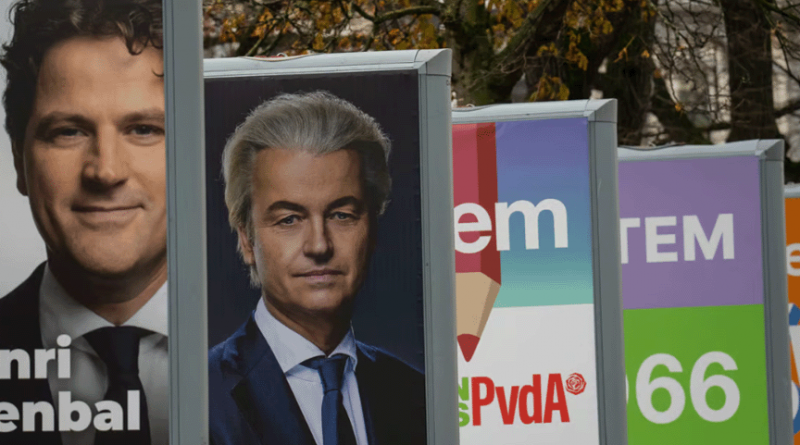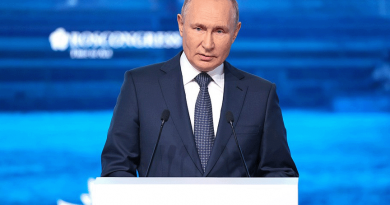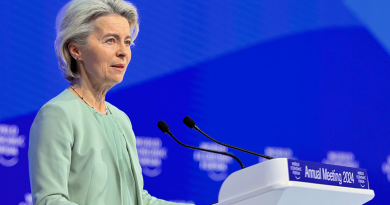Interpreting the Dutch general election
Patrick van Schie is a historian and Director of the TeldersStichting, the liberal think tank of the Netherlands
2024 will be a year of national elections around the world. In the recent presidential election in Taiwan, Beijing’s attempt to influence the result by undermining support for the party in power did not succeed; their candidate was elected, albeit with a reduced majority.
The contests still to come this year range from fake elections, like the presidential one in Russia (March), to various elections in genuine democracies, such as the United States (November), South Korea (April), Belgium (June) and probably Great Britain as well at some point. There will also be elections for the European Parliament in June.
In a way, the general election which took place in the Netherlands on 22 November 2023 can be seen as an indicator for what might be about to happen more widely in Western democracies, viz. a massive shift to the right. This means that an insight into what really influenced the Dutch election in November could be very illuminating. Has the hard-right won, as many in the media have reported? Is the democratic constitutional state at risk, or is the global situation not really so alarming?
The left, smaller than ever before
Parties on the political left – ranging from the once fairly large social-democratic PvdA and the extreme left (once Maoist) Socialistische Partij to D66, who call themselves social-liberal but have increasingly moved further to the left, and the reformed political party ChristenUnie, which inclines to the left – have never secured a majority of votes in the Netherlands.
If we confine our analysis to the period since the Second World War, we can see that, for the first 25 years, the parties on the political left jointly polled about 35% of the vote. From the 1970s onwards, this grew to reach levels typically between 40% and 45%, with two peaks occurring of nearly half of total votes. The last of these peaks happened in 2012, and the political left has gone downhill rapidly ever since.
In November 2023, all the parties on the left of the spectrum taken together won no more than a third of the votes, and their seats in the House of Representatives were distributed between no fewer than seven parties. This is the weakest position the left in the Netherlands has been in since 1922.
As is the case in many modern Western countries, the political left in the Netherlands is having to face the effects of a dwindling working class which, for that matter, was always small compared to other Western European countries.
However, if we interpret the traditional target group of the social-democratic parties in a broader sense to include workers from the lower middle class and those in receipt of social benefits, it is striking to see how quickly the left has also lost the electoral support of these groups.
The fact that the social-democratic PvdA entered the latest elections as part of a joint electoral list with GroenLinks has contributed to this decline. The latter party is particularly popular among those with a relatively high standard of education, who consider themselves to be more cosmopolitan and worldly-wise. Their support seems to have chased away the last vestiges of less well-educated PvdA voters.
At the time of the 2021 election the PvdA still had a few strongholds in the northern parts of the country, but these voters too seem now to have mostly turned towards centre or right-wing parties.
In common with many Western countries, the political left in the Netherlands is still largely in control of the mainstream media, most university faculties and numerous NGOs. Dismay is prevalent among these groups at both the fact that the political left has dwindled so dramatically, and at the success of Geert Wilders’ PVV in the recent elections (to which we will return).
Even after two and a half months (the time at which I write) many people have yet to come to terms with the blow. However, any tendency to want to put their own house in order – where did we fail? – is not much in evidence; instead, it is the voters who get the blame.
It is they who have failed to understand, and it will have to be more effectively explained to them – yet again – why politically-left plans are so much better for them. Surely then they are bound to repent, and will undoubtedly cast their votes to the left ‘as usual’.
This particular way of thinking is expressed openly by many leftist politicians and journalists. The political party GroenLinks has even gone to the lengths of organising demonstrations against the results of the election in a number of Dutch cities.
Although it is seen as entirely justifiable to condemn Trump for never having accepted his electoral defeat in 2020, there is something of a blind spot when it comes to recognising that the mental disposition of the political left in the Netherlands can hardly be called any sounder.
If the clear course signalled by Dutch voters on 22 November is wilfully ignored by the politicians, it is that which should be considered a deficiency of democracy
A volatile electorate
Capturing more than 19% of Dutch votes, in March 2023 the Farmer-Citizen Movement (BoerBurgerBeweging – BBB) emerged from the Provincial Council elections as the largest party [see my article in WCR Summer 2023]. Only 4.5% of that impressive share of the vote remained after the elections of 22 November. Where had all those voters gone?
The impressive vote for the BBB in March was largely a manifestation of protest. The cabinet’s plans to reduce nitrogen emissions were a key political issue at the time, and the BBB gave voice to the protests raised against those plans, which were aimed at shrinking the livestock population and might possibly even have slapped compulsory purchase orders on farms.
This protest was also supported by many citizens not employed in the agricultural industry. Why? Because not only did those citizens object to the measures to curb nitrogen emissions, but a number of the other measures proposed would have profoundly impacted the everyday life of all citizens, affecting the ways in which they would be permitted to heat their homes (no gas), what they would still be allowed to eat (no meat) and where they should spend their holidays (no flying) right down to the traditions they would still be allowed to keep (no Sinterklaas celebration that included a Black Pete) and their attitude to their national history (they are supposed to feel ashamed due to the country’s former links with the slave trade).
After all, although the political left had never achieved a majority in the Netherlands, their policy had largely been determined in the past by the agendas of two left-wing coalition parties – D66 and ChristenUnie – who had required, in return for their support for co-government by the liberal VVD and the Christian-democratic CDA, a policy aimed at re-educating citizens to render them climate-conscious, animal-friendly and inclusive (a people with an aversion to anything smacking even remotely of national pride). Henceforth, the population would be expected to lead a more blameless and ‘politically correct’ life.
On 22 November 2023, a growing dislike of this left-leaning political agenda coincided with popular resistance to the apparently incessant flow of migrants into the country, the general consensus being that this definitely did not consist only of genuine refugees, but was, for the most part, composed of economic migrants from countries officially designated as safe.
Furthermore, there had been a number of scandals in the Netherlands relating to government interventions affecting citizens. The cause was actually situated in an over-ambitious government which could obviously not make good its promises. For that matter, few political parties have drawn the conclusion that a responsible government should promise less and focus more on its core responsibilities.
Some of the disaffected now favoured the new party of a Christian-democratic dissident, Pieter Omtzigt, who, in his capacity as a Representative, had used his clout to defend citizens who felt they had been crushed by governmental institutions.
His party, New Social Contract (NSC), and the PVV of Geert Wilders were the big winners of the elections for the House of Representatives. The NSC, still a newcomer, secured 13% of the votes, while the PVV soared from 11% in 2021 to more than 23% in November 2023.
There are hardly any true-blue voters left in the Netherlands. This also goes for PVV and NSC voters, who do not necessarily subscribe to all the manifesto aims of the parties they have voted for. Whereas PVV voters are mainly intent on stemming the flow of immigrants and a cabinet with a more right-wing feel, NSC voters consider it especially important that citizens are taken seriously and want to see a reduction in governmental red tape and control from The Hague (the seat of Dutch government).
Apart from a small core electorate, neither of these parties can be sure that their supporters in November will vote for them in a future election. This high degree of volatility in the electorate is uncomfortable for political parties, but can at the same time be seen as highly democratic, in the sense that most voters will make a fresh assessment each time as to which party deserves their vote.
Did the Netherlands vote far-right?
Judged on their manifestos and party leaders, both the NSC and BBB are essentially centre-right parties. The NSC’s view of society and manifesto exhibit many similarities to the traditional ideological framework of the Christian democrats.
Not surprising really, since both its leader (Omtzigt) and quite a few of its new members in the House of Representatives have their roots in the Christian-democratic CDA. That CDA, however, has now totally collapsed. The three parties from which the CDA arose in 1980 could claim roughly half of the electorate between 1918 (when the general voting right was introduced in the Netherlands) and 1967, but in November 2023, the CDA polled a paltry 3.25% of the vote.
By November, the BBB had relapsed into its core: a farmers’ protest movement. Before its brief meteoric rise, BBB constituents had largely cast their votes for the CDA, and to a lesser extent for the VVD.
But what about Wilders and his PVV? Is that not an extreme-right party? Leftist journalists and politicians think it is, which is why they are sounding the alarm, just as Aurelien Mondon did in an edition of World Commerce Review. With a single denominator, he classified Wilders and his party with other ‘far-right’ parties, and raised the alarm about ‘the threat they pose to democracy’.
It is a fact that in the past Wilders had been in touch more than once with people like Marine le Pen, Filip de Winter and Viktor Orbán. Without a shadow of a doubt his party is anti-Islamic; not because it is racist, but because Wilders considers that Islam poses a threat to the Western way of life and to its freedoms. He perceives Islam to be the manifestation of a dangerous fascist ideology rather than a religion proper.
Despite all this, there are definitely two PVV characteristics that distinguish the party from what is generally denoted as extreme-right. First, there is no indication that Wilders has an anti-democratic frame of mind.
Following the results of the election, as during the campaign, he made it abundantly clear that he realised he would have to form a coalition in order to be able to govern, that he would have to accept compromises, and that although future elections may yield profit for him, they may just as well bring loss.
In the past, he has never disputed less favourable electoral outcomes. Second, Wilders does not have an anti-Semitic past, quite the contrary. Up to now he has been an outspoken advocate of support for Israel, especially after the horrific terrorist attacks committed by Hamas in Israel on 7 October 2023.
Indeed, the very demonstrations by the left in which the anti-Semitic Hamas slogan ‘from the river to the sea…’ was chanted probably contributed to the electoral victory of Wilders and the PVV.
None of this means that we should not find fault with the outspoken and often deliberately provocative statements that Wilders undoubtedly made in the past, or with some of the points in his manifesto. Quite a few of the new Wilders voters have indicated in opinion polls that they consider some of his past statements ‘too outrageous’, and hope that he won’t be able to implement his manifesto in full.
The chance of that happening is frankly non-existent, if only because the Netherlands is a country governed by coalition. No single party can govern alone thanks to the voting system of proportional representation with no electoral threshold (and without the advantages for large political parties that apply in countries such as Italy and Greece).
No single party in the Netherlands has ever secured more than a third of the total vote. The highest number of seats ever secured in the House of Representatives by a single party was 54 (of a total of 150). That was the number the CDA still managed to reach in 1986, and again three years later.
Although a somewhat pompous CDA member of the House of Representatives affirmed at the time ‘We rule this country’, the CDA also had to look for coalition partners in order to be able to wield power.
The envisaged coalition, attempts at the formation of which are currently being made, will consist, one way or another, of four parties. In addition to the PVV, these are: the NSC, the BBB and the liberal VVD (the party led by Prime Minister Rutte between 2006 and 2023).
It has been said that more than three quarters of the Dutch people did not cast their vote for Wilders – which is true – but opinion polls have shown that more than 80% of those who voted for the VVD, NSC and BBB want a right-wing coalition with the PVV, so such a coalition is clearly the preference of a majority of Dutch voters.
If such a coalition were to be effectively realised, things would definitely be set to change; a less pushy green culture and nitrogen policy, a more restrictive immigration policy and the renewal of a more EU-critical attitude are the least we can expect. When the time comes, people must make of that what they will according to their own political preferences.
I, for one, do not shy away from predicting at least three things in the event of such a coalition being achieved. First, that any policy likely to be implemented can only be dubbed ‘extreme’ by those who themselves have adopted an ultra-radical leftist line.
Second, that it is as yet unclear whether voters will see precisely the policy they voted for supported by a majority, but that for the time being they can rely on being liberated from unrelenting meddling in their private lives. And third, that democracy in the Netherlands is not at risk in the foreseeable future.
If, on the other hand, attempts to shape a cabinet underpinned by the PVV, VVD, NSC and BBB fall flat on their face due to reluctance on the part of any of the parties, opponents of an allegedly ‘radical-right’ will no doubt be jubilant. Such an eventuality would not, however, lead to some sort of ‘back to normal’ situation, but would only increase the appeal of the PVV. If the clear course signalled by Dutch voters on 22 November is wilfully ignored by the politicians, it is that which should be considered a deficiency of democracy.
Author’s note: It must be made clear that he is in no way connected with the PVV, NSC or BBB. He has tried, in this article, and also on the basis of opinion polls and exit polls, to understand the actions of voters in order – as a scientist – to be able to provide a picture of the Dutch political landscape that is as correct as possible.




